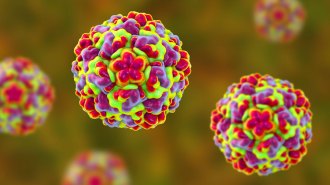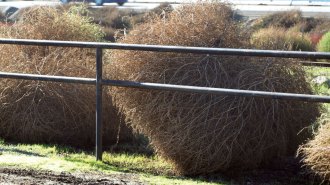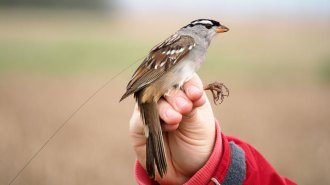Life
Sign up for our newsletter
We summarize the week's scientific breakthroughs every Thursday.
-
 Space
Space‘Imagined Life’ envisions the odd critters of other planets
The authors of ‘Imagined Life’ rely on science to sketch out what kind of organisms might exist on exoplanets.
By Sid Perkins -
 Life
LifeConnecting our dwindling natural habitats could help preserve plant diversity
As pristine habitats shrink worldwide, a massive, 18-year experiment suggests that linking up what's left with natural corridors could help ecosystems retain plant diversity.
-
 Health & Medicine
Health & MedicineA mouse’s metabolism may follow circadian rhythms set by gut bacteria
While animals’ circadian clocks control functions from sleep to hormone release, gut bacteria dictate when mice’s small intestines take up fat.
-
 Life
LifeLosing genes may have helped whales’ ancestors adapt to life under the sea
Jettisoning genes tied to saliva and the lungs, among others, could have smoothed ancient cetaceans’ land-to-water transition 50 million years ago.
-
 Climate
ClimateHow climate change is already altering oceans and ice, and what’s to come
A new IPCC report gives the lowdown on how climate change is already wreaking havoc on Earth’s oceans and frozen regions, and how much worse things could get.
-
 Health & Medicine
Health & MedicineDisabling one protein might one day lead to a cure for the common cold
Scientists have identified a protein in humans that some viruses, including those that cause colds, need to spread.
By Sofie Bates -
 Life
LifeCats may have ‘attachment styles’ that mirror people’s
In a new study, 65 percent of felines formed secure attachments with their owners. Like people, other cats were ambivalent or avoidant.
By Sofie Bates -
 Plants
PlantsWhy tumbleweeds may be more science fiction than Old West
A tumbleweed is just a maternal plant corpse giving her living seeds a chance at a good life somewhere new.
By Susan Milius -
 Life
LifeWe’ve lost 3 billion birds since 1970 in North America
Scientists estimated the change in total number of individual birds since 1970. They found profound losses spread among rare and common birds alike.
-
 Humans
HumansAncient DNA reveals the first glimpse of what a Denisovan may have looked like
A controversial technique reconstructs a teenage Denisovan’s physical appearance from genetics.
By Bruce Bower -
 Life
LifeClimate change may be throwing coral sex out of sync
Several widespread corals in the Red Sea are flubbing cues to spawn en masse.
By Susan Milius -
 Agriculture
AgricultureBirds fed a common pesticide lost weight rapidly and had migration delays
Scientists have previously implicated neonicotinoid pesticides in declining bee populations. Now a study suggests that songbirds are affected, too.
By Maanvi Singh